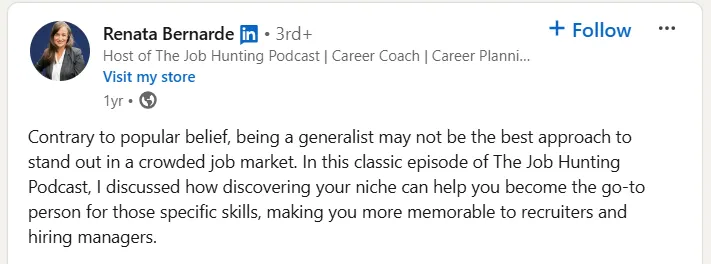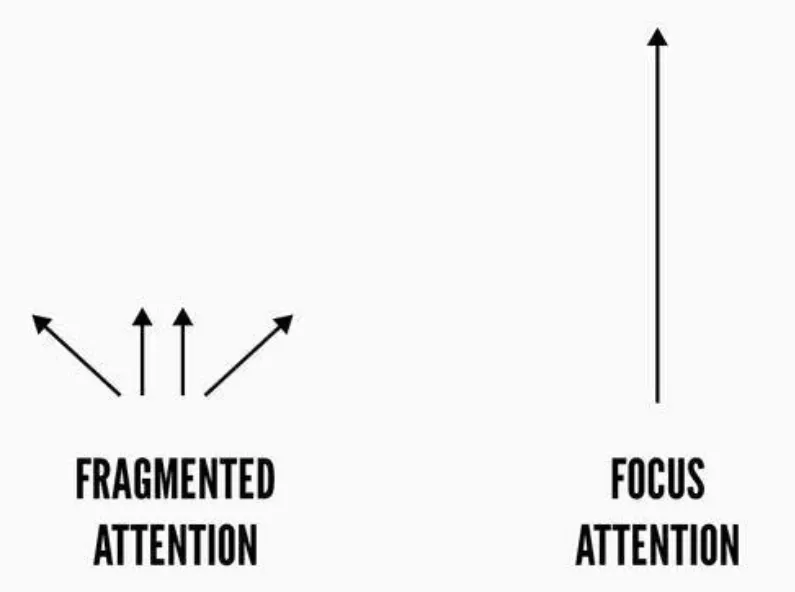Niche Specialization: Benefits of Being the Master of One
Dive into the benefits of becoming a specialist and learn why mastering one niche may be the key to your professional growth.
Table of contents

Dive into the benefits of becoming a specialist and learn why mastering one niche may be the key to your professional growth.
Ever felt like a jack-of-all-trades but a master of none? You’re not alone. Many people have a generalized knowledge but don’t specialize in a niche. But In today's competitive job market, the key to standing out is becoming at least the master of one. Specializing in a niche can be the difference between blending in and being unforgettable.
Renata, a career coach from Melbourne, shared her insights on the profound impact of niching down. Renata’s journey into specialization wasn't immediate. She recounted the early stages of her career, where she resisted being too specific about her expertise. "Everybody thinks that they're a generalist, right? And you are most likely not a generalist," Renata reminds us. Specialization is not just about narrowing your focus; it's about honing your unique strengths and becoming an expert in a specific area. This deep dive into a particular field not only enhances your skills but also makes you indispensable in your industry. As Renata puts it, "It's fine to be an expert in something. To have skills in a specific area."

Transitioning from a generalist to a specialist requires understanding your strengths, passions, and the unique value you bring. It’s about recognizing the moments when colleagues turn to you for help – those are the clues to your niche. Renata found hers in job hunting and career coaching, which has since become her unique selling point. For anyone looking to stand out, it’s about being specific with what you’re good at and letting that specialization shine in your resume and LinkedIn profile.
To achieve this, you can reskill yourself in what you are good at. Learn the no-code technology to aid your skill set with the most trendy market demands. This focused approach not only makes you more memorable but also positions you as an expert in your field. Now, let’s explore the four key benefits of mastering a niche and how it can transform your career.
Diving deep into a specific niche can transform your career in remarkable ways. Here are four powerful benefits that come from mastering a niche, making you stand out in a crowded market.

Imagine tirelessly working hard, exceeding goals, and still finding yourself back at square one due to factors beyond your control. That's exactly what happened to Mohammed Abdullah, a retail and brand marketing specialist. He was committed, took on multiple internships, and later landed roles in big tech and telecommunications companies. Yet, despite his dedication, he faced layoffs and project cancellations. “In all of these stories, I was so absorbed in my day-to-day tasks, so eager to meet expectations, that I had no time to think about my personal brand,” he recalls. If he had developed a personal brand earlier, he wouldn't have had to prove himself from scratch each time.
Building a strong personal brand means being recognized for your unique skills and expertise. It’s about making yourself the go-to person in your field, much like influencers are trusted by their followers for their insights. Think of it as a way to increase your visibility and resilience in your industry. Mohammed emphasizes, “Being up-to-date in your industry makes you more resilient and adaptable. It means being recognized for your unique self and skills and increasing your visibility, access to opportunities, and growth.” To start, define what makes you unique, what values drive you, and how your expertise contributes to your field. Engage in initiatives that align with your brand and connect with like-minded colleagues to refine and amplify your message.
Unlock job opportunities with our guide on top personal branding strategies.
Joseph Liu’s journey into the world of professional coaching began like many others: with a lot of trial and error. He recalls, “I struggled with committing to a niche when I first started my consultancy 10 years ago. I was concerned about pigeonholing myself or precluding myself from opportunities.” This fear is common, especially when you’re trying to make a mark in a crowded field.
Joseph talks about career transformation
Just like a pair of running shoes designed specifically for road running, your professional niche serves as your unique selling proposition (USP). It differentiates you from the generalists who try to be everything to everyone. By defining his niche as a career change consultant, Joseph clarified his value to potential clients. This specificity allowed him to attract the right clients and establish himself as a go-to expert in his field. He emphasizes, “Err on the side of being more rather than less specific when communicating what you do.” For job seekers and professionals, finding and articulating your niche can make you stand out in a competitive market, ensuring that your reskilled, unique skills and expertise are recognized and sought after.

Now, we’ll explore how niche specialization can provide a significant competitive edge through two compelling examples: Flamousdeath, a Redditor and database expert who became indispensable in his teams, and AnotherDrunkCanadian, also a Reddit user who successfully launched a unique VR arcade in Tahiti.
Flamousdeath’s journey to becoming the go-to database expert in every team exemplifies how niche expertise can give you a significant competitive edge. Straight out of university, his mentor from Oracle ignited his interest in the inner workings of relational database management systems (RDBMS). Over the years, by consistently raising his hand for tasks others shied away from, such as data migrations and schema setups, he built a unique skill set.
"I still don't have even a fraction of the knowledge that the average DBA in my company has," he humbly admits. Yet, his niche expertise stood out in a recent org-level design meeting where he, along with only two others out of fifty senior engineers, spotted a subtle error in the proposed schema. This is not miraculous, as even without hardcore technical skills, you can also learn no-code skills to set foot in the technical world. To learn such skills you can join cohort programs like ones at NoCode Institute and get an entry in the modern marketplace.
AnotherDrunkCanadian’s VR arcade in Tahiti showcases how niche specialization can lead to business success, even in the face of unforeseen challenges. By focusing on multiplayer VR experiences, this Redditor tapped into a specific market need: the local gaming community’s desire for immersive experiences without the constraints of small living spaces and expensive internet. This strategic focus allowed them to offer something unique and valuable to their clients.
Despite the setback of opening just before the pandemic, he persevered and adapted, eventually forging partnerships with diverse groups like the army and schools. This niche specialization not only set him apart from competitors but also solidified his position as a valued, innovative player in the entertainment industry. This shows that with the changing world, technical skills have become inseparable from any business. If you are looking to start one, you must have these skills. Learn how acquiring tech knowledge for your new business is easy with no-code programs.
Both stories highlight that honing a specialized skill or service can distinguish you from others and create opportunities for success and resilience.

Niche specialization doesn’t just make you a standout in your field; it also fosters all-round development by allowing you to dive deep into specific areas while maintaining a broader perspective. Michael O. Church, a functional programmer and machine learning engineer, illustrates this beautifully with his approach to balancing generalism and specialism.
Church emphasizes the importance of both breadth and depth in professional development. “Generalism is breadth-first search; specialism is depth-first,” he says. This means that while it's crucial to have a broad understanding to discover new specialities, diving deep into areas that interest you and offer significant benefits is equally essential.
Through his experiences, Church has learned that the lines between the "big picture" and the "details" are often blurred. For instance, what might be a "big picture" for a CEO—like comparing machine learning approaches—is actually a "detail" concern for an engineer, who must then focus on the nitty-gritty details of code and numerical stability. This fractal-like nature of knowledge underscores the importance of understanding both the overarching concepts and the intricate specifics, demonstrating how specialization in a niche can enhance your ability to contribute to the broader field.
Thus, generalization is also necessary in niche development. Whether you are a teacher or a mechanic, you should have an idea of the technology that drives the modern world. NoCode Institute presents this opportunity in a friendly cohort environment. Their programs are designed to train you in the latest technologies you can use in all walks of life. You can check their reviews and testimonials to find out what path you will take in these programs.
Building a niche isn't just about narrowing your focus; it's about strategically positioning yourself to stand out and thrive. In this section, we'll uncover two key secrets to help you identify and establish your niche, ensuring you become a sought-after expert in your field.
Michelle "MACE" Curran, a former Lead Solo Pilot for the Air Force Thunderbirds, experienced firsthand the power of specialization. Despite her extensive skills flying multi-role F-16 jets, it was her precision work with the Thunderbirds that highlighted the benefits of intense focus. Michelle explains how focusing on one area of expertise allowed her to achieve levels of precision and skill that were unparalleled, proving that niche specialization offers unique value and job satisfaction.

“Finding your niche involves identifying what you excel at and enjoy. Consider your natural abilities, the skills you use in your spare time, and what others compliment you on.”, she notes. Reflect on past work experiences and assess industry needs to align your speciality with marketplace opportunities. As Michelle emphasizes, “don’t feel pressured to be great at everything”. Choose one thing and strive to be exceptional, leveraging your unique talents to build a fulfilling and impactful career.
Erik Dietrich's belief in picking a niche over a specialty becomes evident in his numerous blog posts and YouTube videos. He often differentiates between generalizing, specializing, and niching, emphasizing that specializing involves honing your skill set and hoping for demand while niching means identifying and filling a specific market need. Erik recalls using his "key accomplishments" on his resume to guide his specialization, which he now sees as insufficient for true niche success.
Erik talks about Niche
He recounts his experience at a company that developed hearing aid fitting software. His initial pride in technical accomplishments like unit tests and code metrics didn't align with the company's primary goal of enabling hearing aid sales. Instead, understanding the business context—why the software was valuable to audiologists and end users—helped him identify niches that companies would genuinely pay for.
Erik advises looking at past job experiences to understand how they contribute to the company's revenue and identifying areas where one's expertise meets market needs. This approach ensures that efforts are not only personally fulfilling but also financially viable. If you are scratching your head about what your skills really are, learn more about how you can find out which tech career is right for you. Learn the steps to conduct thorough industry research to uncover job opportunities.
Staying updated on industry advancements and best practices is crucial for maintaining your edge in any niche. The landscape of any industry evolves rapidly, and continuous learning ensures you remain relevant and valuable. By committing to ongoing education, attending workshops, and engaging in professional networks, you can keep your skills sharp and your knowledge current. This dedication not only reinforces your expertise but also opens up new opportunities for growth and innovation within your chosen niche. Unlock career success with these 6 tips on leveraging support systems in reskilling programs.
For job hunters, niche specialization offers numerous benefits. It helps you build a strong personal brand, provides a unique selling proposition, gives you a competitive edge, and nurtures all-round development. At NoCode Institute, we believe in empowering individuals with the tools and knowledge needed to excel in their careers. Our programs are designed to help you learn, identify, and develop your niche, ensuring you stay ahead in the job market. Join us today and take the first step towards a fulfilling and successful career. Visit NoCode Institute's website to learn more and enroll in our specialized courses. Your journey to mastery starts here!
Looking to re-invent yourself and turn your talent into a career? Stay up to date with the latest.